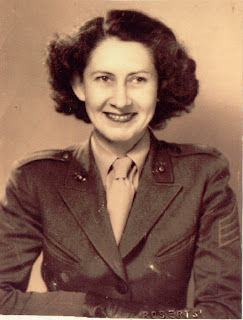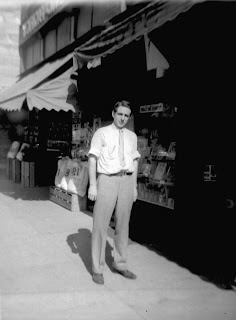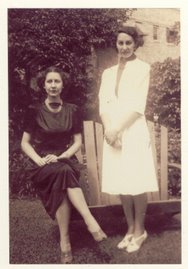
Hughberta dangled an iridescent morsel over the rim of the glass; then twirling the stem slowly, spun little amber eddies along the surface. She had been waiting for an hour. She would sit there all night if need be. Exasperated but bored, feeling very much the petulant ingenue whose persona she had adopted for the evening, she plunged the cherry into the tart high ball and popped it into her mouth. Mmm Yumm. “That takes care of the fruit group for the day.”
Another big Saturday night at the Circle Pub in Prairie duChien, Wisconsin.
A jaunty figure approached her booth.
Apparently in rapt meditation on the essence of the Whiskey Sour before her, she thoughtfully set her upper teeth on the corner of her lower lip- artfully painted “L’Amour Red” by Coty. Her right eyebrow – smoothly arched and deftly defined with “Walnut Bark” pencil, also by Coty- lifted as she brought her shoulder practically up to her earlobe, allowing her rich, brown, sleekly bobbed hair- highlighted with a little Henna- to fall across the ivory satin lapels of her blouse. Any Saturday night regular happening to glance in that direction would easily conclude that the slightly built, attractive woman in booth number 8 found the cocky fellow standing before her a tedious bore. In fact, it seemed that everyone in the bar was just happening to glance her way. Bar stools were swiveling; booths were emptying; necks were craning. A few small wagers were quietly laid down. Confrontation was in the air; drama was unfolding. Hughberta, appropriately costumed and made up (she had unpacked and set out on shelves every beauty product offered for sale in Prairie duChien) was on center stage.
She was not unaware of her audience. The venerable Circle was unusually quiet. She might as well play her part, for, in truth, she was beyond tears, beyond doubts and recriminations, beyond anger and vengeful schemes: even beyond annoyance. A fluid elevation of the chin to rest upon a slender hand, the pointed nails polished a dangerous red languished above her drink. With a world weary sigh, she lifted her mascared lashes and pursed her lips firmly together. Disdain. Regret. A Garbo-esque performance- all of which was pretty much lost on Cletus, who was staring at the glass of whiskey. He slid into the booth beside her and flashed his knock-em-dead grin. “Hey Steenie, did you order one for me?”
“Order your own damn drink, Cletus.”
“Aw, come on, Steen. Cheer up. What’s goin’ on?”
“What’s going on? You’re asking me what’s going on? I’ve been stuck here in this muddy little town , taking care of your business, making excuses, afraid for months to even ask myself ‘What’s going on.’ But you had to know that really I knew. I keep the books. Money going out. Inventory dwindling- war shortages. You’re gone to Madison, gone to Dubuque, gone to St. Paul. Lame excuses. Looking for markets. Looking for stock. Shrewd investments. Apparently you forgot. I am smart. I am way smarter than you.”
“Oh, calm down, Hughie. I’ve got some good prospects out there- it’s gonna take a while for something to happen."
He drew his fingers through a softly waving shock of light brown hair- no greasy kid stuff for that handsome head- which he turned abruptly and shouted across the aisle,
“Hey, Al! What does a guy have to do to get a drink around here?”
Then, just as quickly, he turned again toward Hughberta, looking a bit stunned as she escalated her verbal attack in a voice clearly heard on the other side of the room.
“Take a while?! About nine months, I’d guess. You’re a rat! A two-timer! A three-timer! A four or five timer!”
Hughberta took a satisfying gulp of her whiskey sour. She was now in her Barbara Stanwyck mode. She took some unexpressed delight in noticing Cletus’ thirsty eyes follow the movement of her hand to lip.
“You told me we were working for something real. Something permanent. You said that when this business was profitable, we’d build up the store and get that rose-covered cottage. Phooey!”
Cletus knew how to handle this. Feisty little thing- she'd get her dander up once in a while, but he could always bring her around. And he was thinking that he’d have to get past this little spat so he could relax with his seven-seven.
“Ah, Steenie. Nobody else matters to me but you. Other women are just- passing fancies- they don’t mean anything. You know how I feel about you.”
“Yes, I do know how you feel about me. You feel that you can depend on your faithful little pal to run your store, clean your house, fry your eggs and wipe your...nose so that you can run around sowing your oats over three states. You feel that you don’t have to do a damn thing arond here because your galley slave will do it all. Well, I’ve got news for you! You’re going back to work. Six days a week- nine to five. Your addled friend has come to her senses and has locked up the Ben Franklin for the last time. I’m leaving.”
“What? Don’t be stupid. You can’t leave your job. Where do you think you’ll find another deal like the one you've got here?”
“Not around this one-horse burg. My uncle just hired me for a swell new position with room, board and free travel to exciting places.”
Cletus was now on his feet, an index finger thrust derisively in Hughberta’s face.
“What uncle? You don’t have an uncle with a pot to piss in.”
“My uncle Sam. Don’t get tough with me, Mr. Dime Store. I am a United States Marine.”
A collective gasp wafted to the timbered ceiling of the Circle Tavern.




